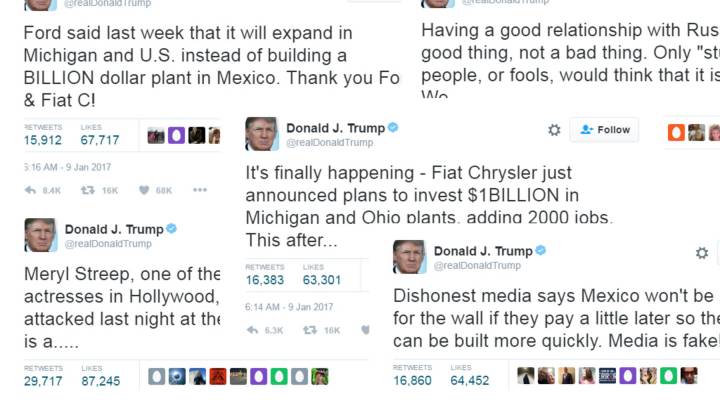
Twitter is struggling to turn relevance into revenue

When President-elect Donald Trump tweets, it makes headlines. He regularly uses Twitter to make announcements, call people out and, for better or for worse, shape policy. Despite this being Trump’s main communication, Twitter — the company — is not benefiting financially.
Its stock is struggling, several top executives have left the company in the last six months and it has not had a significant increase in new users.
Marketplace host Kai Ryssdal talked to Nick Bilton, a special correspondent for Vanity Fair, about his most recent piece, “After Trump, will Twitter Wither?” Below is a transcript that was edited for clarity and brevity.
Kai Ryssdal: Here we have a company that is the primary means of communication for the president-elect of the United States and it is still somehow in trouble.
Nick Bilton: You know, I’ve been covering all these companies for a long, long, time and I have never seen a company whether a for profit, nonprofit, anything that has so much trouble financially, new users, all these different things — but yet is so utterly relevant to society.
Ryssdal: Relevant ain’t revenue, though.
Bilton: No, it’s not. And one of the things that’s been really interesting is when you look at some of the reports from JP Morgan and analysts and so on they you know they assumed that okay, there will be a Trump effect.
Ryssdal: Right.
Bilton: Using Twitter would incite people to join. But let’s look at the numbers: 62 million people voted for Trump and Trump has 18 million followers on Twitter — 19 million today actually, just crossed.
Ryssdal: So he’s not maximizing the potential use either.
Bilton: Exactly. Also, a lot of those followers are bots. They’re not real people. And so people are not joining Twitter just to see what Trump has to say.
Ryssdal: You make a very interesting point in this piece that Kim Kardashian gets more interactions with her tweets than Donald Trump ever does.
Bilton: Completely. I mean, an average Donald Trump tweet, even with those bots, he’s still getting a tiny fraction of what some of these bigger celebrities are getting. A tweet from one of the guys from One Direction has 2.3 million retweets and likes and Trump’s get 20, 30, 40 thousand maybe.
Ryssdal: Let me get you to the business side of this operation. Jack Dorsey, with whom you’ve spoken many times — we’ve had him on this program — is the CEO of the company, he faces 2017 that’s going to be very interesting. He’s got a whole bunch of executives he’s got to replace, he’s got that average users thing he’s got to fix, stock price and all that.
Bilton: You know, I would not want to be in Jack’s shoes right now. He’s running two companies still: Square, which is the company is actually doing pretty well, with stocks on the rise. Twitter stock is not doing well and it hasn’t it’s fallen from highs in the 60s after went public, at 30s when Jack joined, it’s now in the teens and there’s a lot of analysts that say it’s going to go south even further. They’ve tried to sell the company to no avail. A lot of people don’t want to buy a service that ISIS uses. And I don’t know how he’s going to fix the massive, massive exodus of really talented people that have left the company over the last six months.
Ryssdal: How big a challenge do you think the idea of not just ISIS but the alt-right — that is, white nationalists and white supremacists — and horrible, vile, abuse is to the continuing business fortunes in this country?
Bilton: I think that one of the things I’ve learned covering companies is that companies become the DNA of their founders. You know Facebook is an incredibly tight and sophisticated institution that has grown because Mark Zuckerberg wants to be king. With Twitter, from day one it was chaos and that is what the actual platform is. Sure it’s a little box that you can type 140 characters into, but you can do a lot of damage with 140 characters as you can see from Donald Trump. If Jack Dorsey wanted to fix the problems that the service has created, it would mean that they’re not going to grow the user base, they’re probably going to see it detract. And that goes against the idea that investors want to see the company grow.
Ryssdal: So in a year, plus or minus, where is Twitter?
Bilton: That’s a great question. I think that in a year the stock will be in the single digits. I really do. I don’t care who’s running, it if you’re Jack Dorsey, Steve Jobs, Donald Trump, whatever. It is not a very easy company to fix. And we’ve seen this they’ve gone through — you know, most Fortune 500 companies have a CEO’s tenure of 10 years. They’ve had five CEOs in 10 years.
Bilton is also the author of “Hatching Twitter,” a book chronicling the start of the company. Hear our interview with him about the book:
There’s a lot happening in the world. Through it all, Marketplace is here for you.
You rely on Marketplace to break down the world’s events and tell you how it affects you in a fact-based, approachable way. We rely on your financial support to keep making that possible.
Your donation today powers the independent journalism that you rely on. For just $5/month, you can help sustain Marketplace so we can keep reporting on the things that matter to you.












